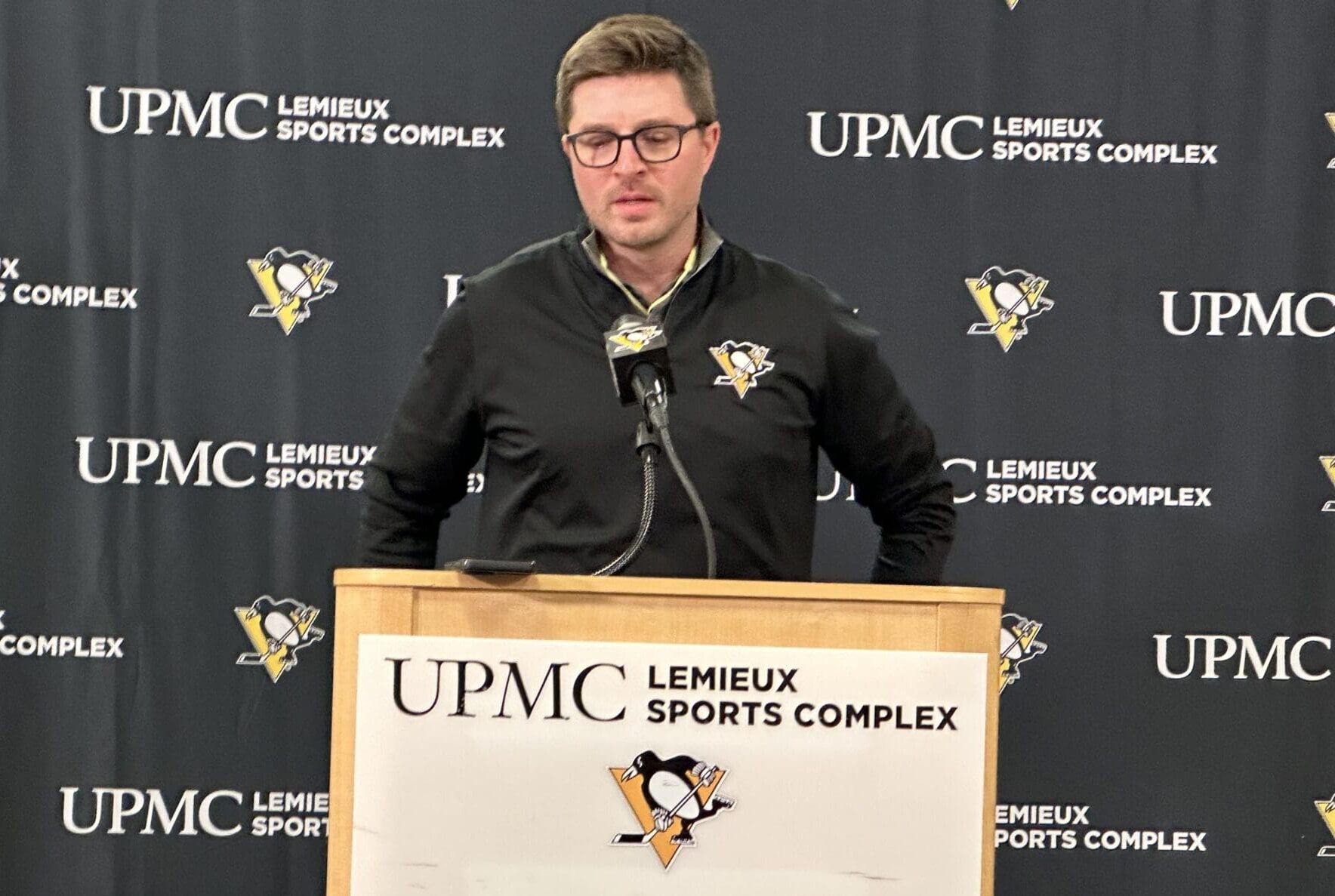Penguins
Molinari: Give Kyle Dubas Credit, Even if You Blame Him

It would have been easy for Kyle Dubas to conclude that it is time for the Pittsburgh Penguins to get a new coach.
After all, they have missed the Stanley Cup playoffs for two years in a row and haven’t won a series in the postseason since 2018. What’s more, Dubas isn’t the guy who hired Mike Sullivan in the first place.
Maybe making a change even would have been the correct thing to do, because while Sullivan is widely regarded as one of the game’s premier coaches, has been on the job since December, 2015, and even the most accomplished NHL coaches seem to have a limited shelf life.
Forget Dog Years; Sullivan’s tenure with the Penguins is roughly eight decades in NHL Coach Years.
But even though bringing in a new coach would placate a vocal segment of the Penguins’ fan base — whether that group is as large as it is loud is hard to say — Dubas never has given any indication that his faith in Sullivan has wavered.
Sure, there was unsubstantiated talk out of Toronto from a frequent Dubs critic about New Jersey GM Tom Fitzgerald trying to lure Sullivan to the Devils, but that speculation proved to be as durable as a puff of steam.
If Sullivan wanted out of the three-year, $16.5 million contract that’s about to kick in, it likely would have happened a while back.
And if Dubas didn’t want Sullivan to be overseeing the Penguins in 2024-25, he would have cut him loose before this.
After all, it’s standard practice in the NHL for a coach who’s not going to be retained to be let go shortly after his team’s season ends, to maximize his chances of finding work elsewhere. (Witness the firing of Penguins associate coach Todd Reirden.)
Because Dubas rarely speaks with reporters, he hasn’t explained what’s gone into the decision to keep Sullivan, but given his consistent praise for Sullivan’s knowledge and commitment to the job, it shouldn’t be a surprise that he came to that conclusion.
That doesn’t mean Dubas won’t change his perspective in the future, but the key point is that he has made a decision that he has to know would not be well-received by a portion of the paying public, but stuck with it because he feels it is in the best interest of the team.
In short, he has shown the courage of his convictions.
That’s a quality that should serve Dubas well in coming months and years, because he is charged with sculpting the short- and long-term futures of this franchise, which means he’ll be responsible for making a lot of determinations on critical issues.
Although it’s imperative that he get input from others — especially if they don’t see something the way he does — Dubas has to have enough faith in his ability to do what he feels is correct, regardless of whether it reflects a majority view.
Sure, he’ll make some mistakes — although he has almost unlimited authority as the president of hockey operations and GM, he’s not The Almighty — but, like a player, he’ll do his best work if he’s confident in his abilities.
Sticking with Sullivan when so many in the fan base were demanding a change is evidence that he is.
Straight Talk from Tocchet
There was nothing subtle about Rick Tocchet during his days as one of the NHL’s premier power forwards — he could beat opponents with a well-placed shot or an on-target right cross — and while he long since has moved into a new role, his style hasn’t changed.
He is fluent in the language of unvarnished truths, as proven again in the wake of Vancouver’s 3-2 loss to Edmonton in Game 4 of their second-round playoff series Tuesday night.
Tocchet, in his first full season behind the bench, led the Canucks to the Pacific Division championship and sixth place in the overall standings, far exceeding most expectations on both counts.
And while he has a knack for connecting with players — remember, he is one of the few who seemed to really get through to Phil Kessel when they were together with the Penguins — Tocchet isn’t shy about publicly skewering them when he deems it appropriate.
The aftermath of the Oilers victory that tied the series, 2-2, was one of those times.
After the game, Tocchet said flatly that his team had “at least a half-dozen passengers” and that lineup changes are possible for Game 5.
While he didn’t specifically name the offenders, Tocchet acknowledged that Elias Pettersson, an 80-point man during the regular season who has just one goal in 10 playoff games, has to elevate his play.
“He’s got to get going,” Tocchet said. “I don’t know what else to say.”
It Pettersson continues to sputter, there’s a pretty good chance the right words will come to Tocchet.
And that he won’t be shy about sharing them.
Paying tribute to Trouba
It was heartwarming to see New York Rangers defenseman Jacob Trouba named the 2024 recipient of the Mark Messier Leadership Award a couple of days ago.
It is handed out annually under the auspices of the NHL, although the player who gets it is chosen solely by Messier, rather than a panel of writers or broadcasters or GMs or anyone else.
While it was not specified whether Trouba earned that long-overdue recognition by establishing himself as the league’s foremost practitioner of the flying forearm shiver/elbow, that’s something teammates and opponents alike surely should admire and try to emulate.
At least until he scrambles their brain with one of his frequent hits to the head, anyway.













